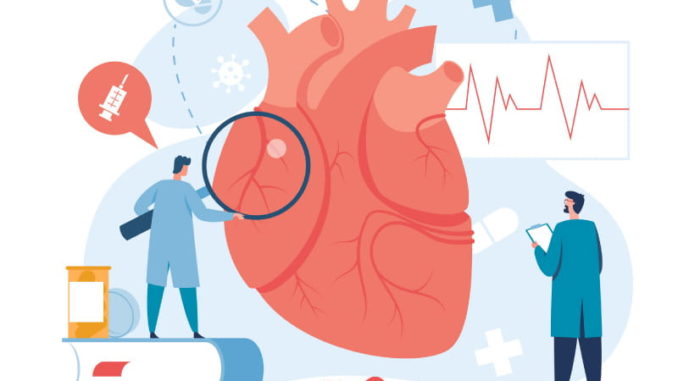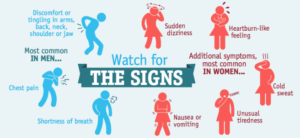
Table of Contents
What is Heart Disease?
- Heart disease is any condition that affects the heart.
- Heart disease includes coronary heart disease, cerebrovascular disease, rheumatic heart disease and other conditions; some of which can be avoided.
- It is sometimes referred as cardiovascular disease (CVD), ischemic heart disease, or heart and blood vessel disease.
- It is a collection of diverse disorders, the majority of which have atherosclerosis as their underlying cause of development.
- Chronic diseases like CVD gradually progress throughout life and go for a long time without showing any symptoms.
- Usually, symptoms are only present in advanced disease, or the first symptom may be sudden death.
Key Facts
- An estimated 17.9 million individuals globally die from cardiovascular diseases (CVDs), which are the primary cause of death.
- They have been the main contributor to premature mortality globally for many years. By 2030, it is predicted that 23.6 million individuals will die from CVD annually.
- More than four out of every five CVD deaths are caused by heart attacks and strokes, and a third of these deaths occur before the age of 70.
- Controlling risk factors (47–75%) and receiving appropriate CVD therapy (25–55%) are to account for the reduction in the CVD mortality rate in highly developed nations.
Types of Heart Disease
Heart related disease is an umbrella word that refers to a variety of cardiovascular disorders. It is a broad term that covers a number of diseases and disorders.
Various heart conditions include:
- Arrhythmia: Unusual heartbeat is referred to as an arrhythmia.
- Atherosclerosis: The arteries stiffen due to atherosclerosis.
- Cardiomyopathy: The heart’s muscles become stiff or weak as a result of this conditions.
- Congenital heart defects: Heart abnormalities that exist from birth are referred to as congenital heart defects.
- Angina: Chest pain from a lack of blood flow is known as angina.
- Heart attacks: It occurs when the heart muscle loses some of its blood supply.
- Heart failure: When your heart cannot pump enough blood to meet your body’s needs, you have heart failure.
- Cardiovascular disease (CAD): Plaque accumulation in the arteries of the heart is leads to CAD. It is also known as ischemic heart disease.
- Stroke: A critical medical condition called a stroke happens when the blood flow to the brain is compromised.
- Heart infections: Bacteria, viruses, or parasites may be the source of heart infections.
- Heart problems that primarily affect the blood arteries are referred to as cardiovascular diseases.
Symptoms of Heart Disease
- Heart valve disease symptoms include fatigue, even during routine everyday tasks, palpitations, breathing problems, a heavy feeling in the chest, and variations in heartbeat.
- Chest pain, often known as angina, is the most typical sign of coronary heart disease. Other body parts, such as the back, arms, throat, shoulders, jaw, or neck, may also experience this kind of pain.
- The symptoms of cardiomyopathy include feeling lethargic, becoming extremely exhausted very quickly for no apparent reason, swelling, and palpitations in the chest.
- Palpitations, a pounding in the chest, unexplainably feeling extremely exhausted, having trouble breathing because of shortness of breath, are cardiac arrhythmia symptoms
Causes of Heart Disease
- Atherosclerosis, or the accumulation of fatty plaques in the arteries, is the most common cause of coronary artery disease.
- Common causes of arrhythmias or disorders:
- Diabetes
- Drug abuse
- Emotional stress
- Excessive alcohol or caffeine use
- Congenital cardiac problems
- High blood pressure
- Smoking, and heart valve disease
- Certain diseases, medications, and hereditary factors increase the risk of congenital cardiac issues.
- Cardiomyopathy frequently has no identified cause. It might be inherited from parents to children (inherited).
- When bacteria, viruses, or parasites infect the heart or heart valves, an illness like endocarditis develops.
- Conditions like infection, rheumatic fever, connective tissue conditions may also contribute to heart valve disease
Risk Factors of Heart Disease
- Unhealthy eating, obesity, usage of tobacco products, and abusing alcohol are the main behavioral risk factors for cardiovascular disease.
- Individuals may experience elevated blood pressure, elevated blood glucose, elevated blood lipids, as well as overweight and obesity as a result of behavioral risk factors.
- These “intermediate risk factors” can be assessed in primary care settings and point to an elevated risk of consequences like heart attack, stroke, and heart failure.
Complications
- Heart failure: One of the most frequent side effects of cardiovascular disease is this. When the heart cannot pump enough blood to meet the needs of the body, heart failure results.
- Heart attack: If a blood clot becomes lodged in a blood vessel leading to the heart, a heart attack could result.
- Stroke: As brain tissue starts to die shortly after a stroke, it is a medical emergency.
- Aneurysm: A bulging in an artery’s wall is known as an aneurysm which ruptures can be potentially fatal.
- Peripheral artery disease: This can result from atherosclerosis.
- Sudden cardiac arrest: The electrical system of the heart is usually the cause.
Prevention
- Eating a balanced diet: Choose a fiber-rich, whole-grain, fresh fruit and vegetable-heavy, heart-healthy diet. The DASH diet and the Mediterranean diet might be beneficial for heart health. Limiting the consumption of processed meals as well as extra fat, salt, and sugar may also be beneficial.
- Regular exercise: This can help regulate blood pressure, lower cholesterol, and improve the heart and circulatory system. Aiming for 150 minutes of exercise per week may be a good idea.
- Healthy body weight: The normal range for a healthy body mass index (BMI) is 20 to 25. Here, one can check their BMI.
- Avoiding smoking: Risk of heart and cardiovascular diseases increases with smoking.
- Managing underlying diseases: Treatment for conditions like high blood pressure, obesity, and diabetes that have an impact on heart health.
Rehabilitation Measures
- Cardiac rehabilitation, commonly known as cardiac rehab, is an individually designed outpatient exercise and education program.
- The program is made to assist you in enhancing your health and recovering from a heart attack, other heart related diseases, or heart surgery.
- A monitored program called cardiac rehabilitation consists of the following:
- Physical exercise.
- Teaching people how to live a healthy lifestyle, including how to eat well, take their medications as directed, and stop smoking.
- Counseling to find methods of stress reduction and mental health enhancement.
- Exercise training, emotional support, and teaching about lifestyle changes to lower risk of cardiovascular disease, such as eating a heart-healthy diet, maintaining a healthy weight, and quitting smoking, are frequently included in cardiac rehabilitation.
- The objectives of cardiac rehabilitation include creating a plan to support in recovery, stop disease from getting worse, lower chance of developing future heart conditions, and enhance health and quality of life.
Treatment
- Treatment for cardiovascular disease is based on the type and cause of heart damage.
- Healthy lifestyle practices, including as quitting smoking, exercising frequently, getting enough sleep, and eating a low-fat, low-sodium diet, are essential components of treatment.
Medications
- Medication may be required to control cardiovascular disease symptoms and to avoid complications if lifestyle modifications alone are ineffective.
- The kind of cardiac condition determines the medicine type.
Procedures such as surgery
- Some cardiovascular disease sufferers might require a treatment or surgery.
- The type of cardiovascular disease and the degree of cardiac damage will determine the sort of operation or surgery.
References and For More Information
https://www.mayoclinic.org/diseases-conditions/heart-disease/diagnosis-treatment/drc-20353124
https://www.ncbi.nlm.nih.gov/pmc/articles/PMC6131408/
https://www.cdc.gov/heartdisease/prevention.htm
https://www.nhs.uk/conditions/coronary-heart-disease/treatment/
https://www.webmd.com/heart-disease/understanding-heart-disease-symptoms
https://www.who.int/health-topics/cardiovascular-diseases#tab=tab_1
https://www.nhlbi.nih.gov/research/coronary-heart-disease
https://www.heart.org/en/health-topics/consumer-healthcare/what-is-cardiovascular-disease
